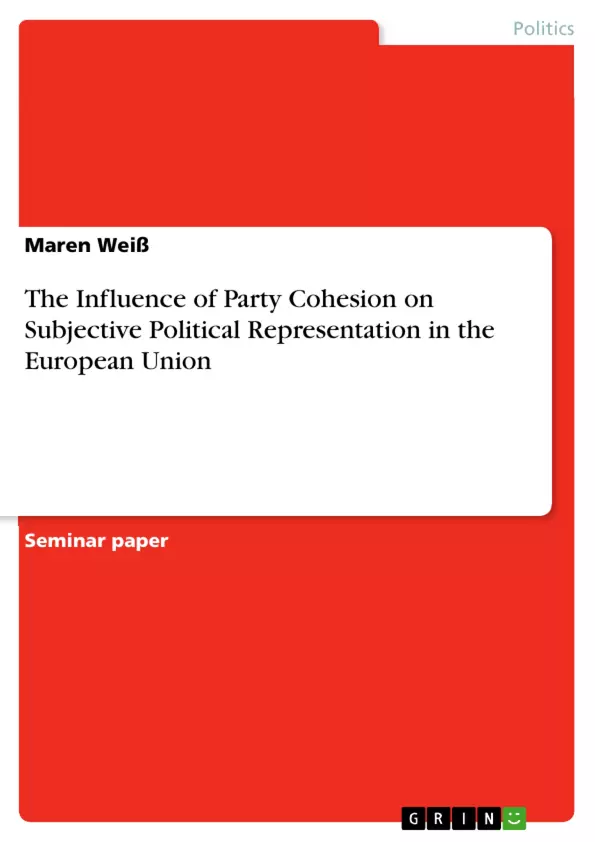This research paper deals with the topic of the representation deficit in the European Parliament. It is observed, whether party cohesion as a form of legislative behaviour, influences the degree of citizens’ subjective perceptions of an adequate political representation. High levels of party cohesion are expected to create individual impressions of an adequate political representation.
To test this theory, I generated a roll-call votes dataset to measure party cohesion since 2017. Together with the latest version of the Eurobarometer dataset of 2018, I observe the subjective level of political representation. The empirical analysis through an ordered logistic regression shows that the hypothesis can cautiously be confirmed, meaning that higher levels of party cohesiveness are associated with higher degrees of subjective political representation.
Inhaltsverzeichnis (Table of Contents)
- Can party cohesion solve the representation deficit in the EU? An introduction
- The accusation of a democratic deficit and the role of party cohesion: A literature review
- How does party cohesion influence subjective political representation? A theoretical argument and hypothesis
- An empirical analysis on the relationship of party cohesion and political representation
- Description of the Data
- Operationalisation of variables
- Analysis of the Results
- To what extent do higher degrees of party cohesion in the EP improve the subjective political representation of the electorate? Discussion and Conclusion
Zielsetzung und Themenschwerpunkte (Objectives and Key Themes)
This research paper investigates the representation deficit in the European Parliament, specifically examining the role of party cohesion in influencing citizens' perceptions of adequate political representation. The study aims to determine whether high levels of party cohesion contribute to individual impressions of effective representation.
- The democratic deficit in the European Union.
- The role of party cohesion in legislative behavior.
- The relationship between party cohesion and subjective political representation.
- The impact of party cohesion on voters' feelings of being represented.
- Potential causes of the representation deficit and policy recommendations.
Zusammenfassung der Kapitel (Chapter Summaries)
- Chapter 1: Can party cohesion solve the representation deficit in the EU? An introduction: This chapter introduces the concept of the democratic deficit in the EU and its implications for political representation. It highlights the weak linkage between MEPs and their constituents, emphasizing the need for research into legislative behaviour and its influence on voters' perceptions of representation. The research question is presented, focusing on the extent to which higher party cohesion in the EP can improve subjective political representation. The importance of this research is discussed in terms of clarifying the severity of the representation deficit and identifying potential causes and solutions.
- Chapter 2: The accusation of a democratic deficit and party cohesion in the EP: A literature review: This chapter provides a comprehensive review of existing literature on the democratic deficit in the EU, specifically addressing the representation deficit and the role of party cohesion. It explores various dimensions of the democratic deficit, including the consequences of European integration, the relative weakness of the EP compared to other institutions, the lack of "European" elections, and the perceived distance between the EU and its citizens. The chapter also discusses the challenges associated with the absence of a concrete European government and opposition, which hinder voters' ability to hold politicians accountable.
- Chapter 3: How does party cohesion influence subjective political representation? A theoretical argument and hypothesis: This chapter develops a theoretical framework to explain the relationship between party cohesion and subjective political representation. It draws on existing literature to argue that higher levels of party cohesion can create a sense of greater accountability and responsiveness among voters, thereby contributing to higher levels of perceived representation. A testable hypothesis is formulated, predicting that increased party cohesion in the EP will be associated with higher degrees of subjective political representation.
- Chapter 4: An empirical analysis on the relationship of party cohesion and political representation: This chapter presents the empirical research methodology employed to investigate the relationship between party cohesion and subjective political representation. It details the creation of a roll-call votes dataset to measure party cohesion since 2017 and the use of the latest Eurobarometer dataset to measure subjective political representation. The chapter outlines the operationalisation of variables and provides an overview of the empirical analysis conducted, foreshadowing the presentation of the results in the subsequent section.
Schlüsselwörter (Keywords)
The main keywords and focus topics of this research paper include democratic deficit, European Parliament, party cohesion, legislative behaviour, subjective political representation, representation deficit, Euroscepticism, voter engagement, accountability, and empirical analysis. The research focuses on the relationship between party cohesion and citizens' perceptions of representation, with the aim of contributing to a better understanding of the challenges and potential solutions for improving democratic accountability and responsiveness in the European Union.
Frequently Asked Questions
What is the "representation deficit" in the European Parliament?
It refers to the perceived gap between EU citizens and their representatives (MEPs), where voters often feel their interests are not adequately reflected in EU policy-making.
How does party cohesion influence voters' perceptions?
High levels of party cohesion create a clearer image of what a political group stands for. This can lead to a higher degree of subjective political representation among the electorate.
Does higher party cohesion improve democratic accountability?
Theoretically, yes. When parties act cohesively, it is easier for voters to hold them accountable for their legislative behavior and decisions in the European Parliament.
What data was used to test the cohesion theory?
The study utilized a dataset of roll-call votes from 2017 to measure cohesion, combined with 2018 Eurobarometer data to assess citizens' subjective levels of representation.
Can party cohesion solve the EU's democratic deficit?
While the research suggests a positive link between cohesiveness and perceived representation, it is only one part of the solution to the broader and more complex issue of the EU's democratic deficit.
- Quote paper
- Maren Weiß (Author), 2019, The Influence of Party Cohesion on Subjective Political Representation in the European Union, Munich, GRIN Verlag, https://www.grin.com/document/489709



